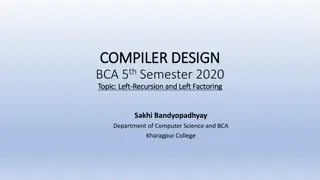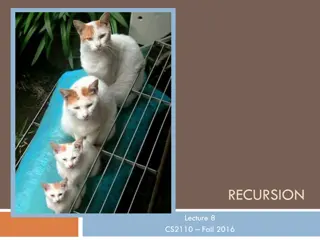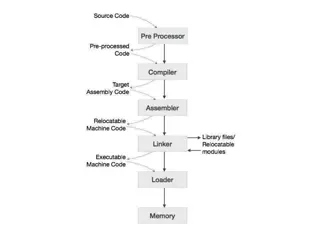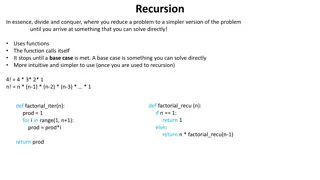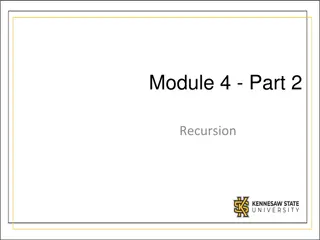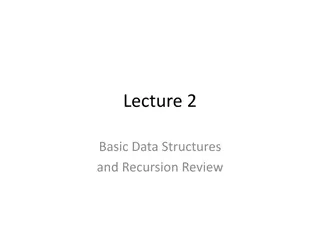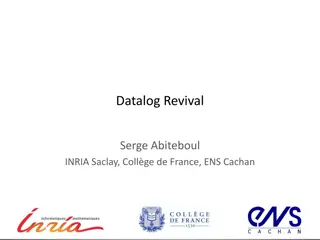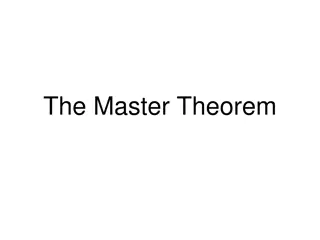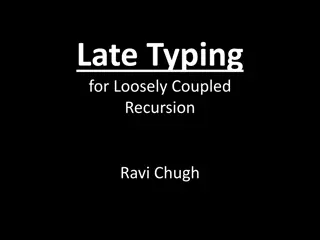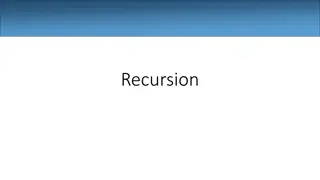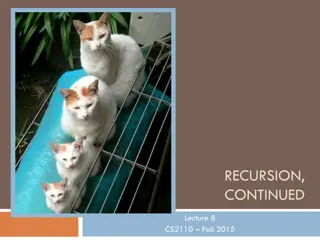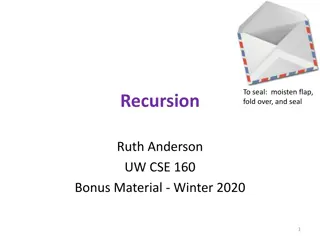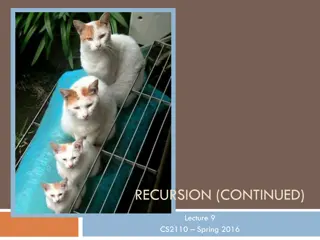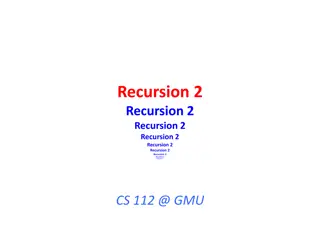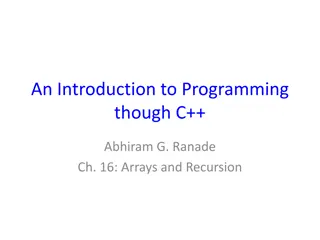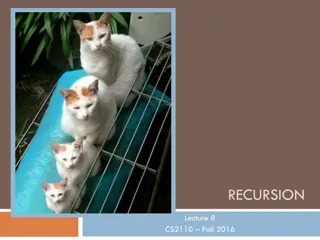Ginzburg Landau phenomenological Theory
The Ginzburg-Landau phenomenological theory explains superconductivity and superfluidity as distinct thermodynamic phases. It focuses on phase transitions characterized by singularities in specific heat at the transition temperature. Derived from BCS theory, it quantifies condensation energy, emphas
1 views • 38 slides
Crystal Field Theory in Transition Metal Complexes
Crystal Field Theory (CFT) explains the colors and magnetic properties of transition metal complexes. It focuses on the energy changes in d-orbitals of metal ions caused by surrounding ligands. This theory, developed in 1929, provides insights into the bonding interactions in complex compounds. The
10 views • 44 slides
Understanding Social Learning Theory and the Power of Example
Social Learning Theory, introduced by Bandura, emphasizes learning through observation and modeling. It explores how individuals acquire behavioral dispositions, trial-and-error experiences, and the impact of stimuli in the environment. The theory focuses on the importance of attention, retention, a
1 views • 17 slides
Evolution of Mathematical Theories and Proof Systems
Development of mathematical theories such as model theory, proof theory, set theory, recursion theory, and computational complexity is discussed, starting from historical perspectives with Dedekind and Peano to Godel's theorems, recursion theory's golden age in the 1930s, and advancements in proof t
1 views • 29 slides
Introduction to Organizational Behavior: Management Theories and Practices
Explore the evolution of organizational behavior from early management theories to contemporary practices. Understand the historical foundations and relevance of management theory in shaping workplace dynamics. Delve into key concepts like Scientific Management, Administrative Management, Bureaucrat
1 views • 28 slides
Psychological Theories of Criminality: Understanding the Roots
Psychological theories of criminality delve into the association between intelligence, personality, learning, and criminal behavior. Major theories include Psychodynamic Theory by Freud, Behavioral Theory by Bandura, and Cognitive Theory by Kohlberg. These theories explore how unconscious mental pro
1 views • 20 slides
Understanding the Theory of Firms: Neoclassical vs. Modern Approaches
The theory of firms is explored through the Neoclassical and Modern perspectives. Neoclassical theory focuses on profit maximization, while Modern theory delves into managerial, principal-agent, and transaction cost theories. The discussion covers criticisms of Neoclassical theory and the essential
1 views • 79 slides
Understanding Left Recursion and Left Factoring in Compiler Design
Left recursion and left factoring are key concepts in compiler design to optimize parsing. Left recursion can be problematic for top-down parsers and needs to be eliminated using specific techniques. Left factoring is a method to resolve ambiguity in grammars with common prefixes, making them suitab
0 views • 15 slides
Theories of Causation in Psychological and Social Sciences
Overview of theories of causation categorized into psychological, social psychological, and sociological perspectives. Psychological theories focus on instinctive, biological, and psychological qualities of abusers, including Attachment Theory, Psychodynamic Theory, Social Learning Theory, and Situa
0 views • 15 slides
Understanding Political Theory through a Contextual Approach
Exploring G.H. Sabine's perspective on political theory through a contextual approach, emphasizing the importance of historical context and societal influences. Sabine argues that while political theory evolves with its contemporary politics, it should be analyzed within its specific time and social
0 views • 9 slides
Evolution of Light Theory: From Wave Theory to Quantum Theory
At the turn of the century, the discovery of the photoelectric effect challenged the wave theory of light, leading to the development of the quantum theory by Max Planck and Albert Einstein. This new theory introduced the concept of discrete energy units known as quanta, bridging the gap between wav
1 views • 62 slides
Dp-branes, NS5-branes, U-duality, and M-Theory Overview
Overview of Dp-branes, NS5-branes, and U-duality derived from nonabelian (2,0) theory with Lie 3-algebra. Introduction to M-theory, including M2-branes and M5-branes in the strong coupling limit. Discussion on BLG theory, Lorentzian Lie 3-algebra, and the ABJM theory for M2-branes.
1 views • 32 slides
Understanding Recursion in CS2110: Fall 2016 Lecture Insights
Covering the concept of recursion in CS2110 Fall 2016 lecture, this content delves into key topics such as base case, Java stack frames, and flipping the class methodology. It emphasizes the importance of hands-on problem-solving for better learning outcomes. The approach of watching short videos an
0 views • 37 slides
Understanding Time-Independent Perturbation Theory in Quantum Mechanics
Perturbation theory is a powerful tool in solving complex physical and mathematical problems approximately by adjusting solutions from a related problem with known solutions. This theory allows for more accurate approximate solutions by treating the difference as a small perturbation. An example inv
0 views • 19 slides
Ethical Theories: Divine Command vs. Virtue Theory Explained
Divine Command Theory asserts that morality is derived from God's commands, contrasting with Virtue Theory which focuses on developing moral virtues to achieve human flourishing and excellence. Divine Command Theory relies on religious texts, while Virtue Theory emphasizes the cultivation of virtues
0 views • 24 slides
Understanding Fermi Liquid Theory in Interacting Fermion Systems
Fermi liquid theory, also known as Landau-Fermi liquid theory, is a theoretical model that describes the normal state of metals at low temperatures. Introduced by Landau and further developed by Abrikosov and Khalatnikov, this theory explains the similarities and differences between interacting ferm
0 views • 23 slides
Understanding Issues in Context-Free Grammar: Ambiguity, Precedence, Associativity, and More
Delve into the complexities of context-free grammar, exploring concepts such as ambiguity, precedence, associativity, left recursion, and left factoring. Learn about the challenges posed by left recursion and the differences between ambiguous and unambiguous, as well as deterministic and non-determi
0 views • 7 slides
The Magic of Recursion in Programming
Discover the power of recursion in programming through insightful insights and examples. Explore recursive algorithms, methods, and the significance of believing in yourself as a programmer. Understand the crucial roles of arguments and parameters in methods, and delve into the intricacies of how me
0 views • 77 slides
Exploring Recursion in Computer Science
Exploring the concept of recursion in computer science, this chapter delves into its applications, advantages, and efficiency. From understanding recursive helper methods to analyzing problems suited for recursive solutions, this chapter covers the fundamental principles of recursion using examples
0 views • 86 slides
Understanding Recursion in Computer Science
Recursion is a powerful concept in computer science that involves breaking down a problem into smaller, more manageable parts until a base case is reached and solved directly. By utilizing functions that call themselves, recursion offers an elegant way to solve complex problems. This post delves int
0 views • 13 slides
Understanding Recursion in Programming
Recursion in programming involves a method calling itself to solve problems by breaking them down into simpler subproblems. The process requires a base condition, recursive calls, and progress towards termination. This technique is illustrated through examples like calculating factorials using recur
0 views • 64 slides
Computational Learning Theory: An Overview
Computational Learning Theory explores inductive learning algorithms that generate hypotheses from training sets, emphasizing the uncertainty of generalization. The theory introduces probabilities to measure correctness and certainty, addressing challenges in learning hidden concepts. Through exampl
0 views • 43 slides
Automata Theory and Theory of Computation Overview
This course overview covers concepts in automata theory and theory of computation, including formal language classes, grammars, recognizers, theorems in automata theory, decidability, and intractability of computational problems. The Chomsky hierarchy, interplay between computing components, modern-
0 views • 42 slides
Understanding Basic Data Structures and Recursion in Programming
Explore basic data structures and recursion in programming through a series of lectures covering abstract data types, list operations, array characteristics, linked lists, doubly linked lists, and circular linked lists. Dive into concepts such as array indexing, resizing, and various list implementa
0 views • 92 slides
Theories of Interest in Microeconomics II
Explore various theories of interest in economics, including the Classical Theory, Liquidity Preference Theory by Keynes, Productivity Theory, Abstinence Theory, Time-Preference Theory, Fisher's Time Preference Theory, and the Loanable Fund Theory. These theories offer different perspectives on the
0 views • 6 slides
Datalog Revival and Limitation of Relational Calculus
Datalog, a logic-based programming language, saw a revival in the 21st century with the addition of recursion to positive first-order queries. The history of Datalog traces back to the 1970s with the idea of adding recursion to FO queries. Despite the industry's initial lack of interest, Datalog fou
0 views • 45 slides
Exploring the Evolution of Atomic Theory
Delve into the historical journey of atomic theory starting from Democritus and Aristotle's views to modern advancements proving some aspects of Dalton's theory incorrect. Learn about key laws and theories such as the Particle Theory of Matter, Dalton's Atomic Theory, and JJ Thomson's discoveries, s
0 views • 30 slides
Understanding the Master Theorem for Recursion Equations
The Master Theorem is a powerful tool for analyzing recursion equations commonly found in divide and conquer algorithms. It provides a framework for solving recurrence relations of the form T(n) = aT(n/b) + f(n). By examining different cases and comparing functions with powers of n, we can determine
0 views • 12 slides
Understanding Late Typing in Loosely Coupled Recursion
Explore late typing in loosely coupled recursion through JavaScript and simply-typed calculations. Witness the intricacies of open function types and the guarantee-rely mechanism in defining functions for effective programming.
0 views • 14 slides
Exploring the Power of Recursion in Programming
Understanding recursion is essential for solving complex problems efficiently in programming. Recursion involves breaking down a big problem into smaller instances of the same problem, leading to elegant and concise code. By learning recursion, programmers gain a different perspective on problem-sol
0 views • 36 slides
Understanding Recursive Methods: A Comprehensive Guide
This content delves into the concept of recursion, particularly focusing on understanding recursive methods and how they are executed. It provides steps to approach recursive methods effectively, emphasizing the importance of having a precise specification and verifying correctness in base and recur
0 views • 14 slides
Understanding Recursion in Programming
Explanation of recursion in programming, including objectives, examples, and step-by-step breakdown. Learn how to design functions using recursion to solve problems effectively. Dive into the concept of recursive functions with a practical example of writing digits of an integer vertically. Explore
0 views • 53 slides
Understanding Quicksort Algorithm with Recursion
Exploring the Quicksort algorithm through recursion. From understanding the basic steps to identifying and overcoming problems in the initial implementation, to the final version that handles sorting efficiently. The recursive nature of the algorithm and its application in sorting algorithms are dis
0 views • 20 slides
Understanding Recursion in Programming
An exploration of recursion in programming, focusing on the concept of defining something in terms of itself, the importance of base and recursive cases, and the top-down approach to problem-solving. Examples include the factorial function and walking to a door using recursion-based steps.
0 views • 31 slides
Macromechanical Analysis of Lamina and Tsai-Hill Failure Theory Overview
The Tsai-Hill failure theory is based on the strengths of a unidirectional lamina, incorporating longitudinal and transverse tensile and compressive strengths, as well as in-plane shear strength. This theory, derived from the distortion energy theory, provides criteria for determining lamina failure
0 views • 15 slides
Understanding Recursion in Java: CS2110 Lecture Overview
This content delves into the concept of recursion in the context of Java programming as discussed in the CS2110 Spring 2016 lecture series. It covers the basics of recursion, including base cases and how Java stack frames operate. The material also includes solutions to exception-handling problems a
0 views • 21 slides
Understanding Recursion: A Fundamental Concept in Computer Science
Recursion is a fundamental concept in computer science that involves solving problems by breaking them down into smaller, similar subproblems. This content delves into the basics of recursion, highlighting key components such as the recursive case and base case. It also explores the concept of facto
0 views • 35 slides
Exploring Recursion: Understanding and Implementing in Python
Dive into the concept of recursion in programming, specifically focusing on how it works and exploring its applications through examples like drawing organic shapes and fractals. Learn about base and recursive cases, alongside practical functions for drawing triangles and creating Sierpinski triangl
0 views • 18 slides
Introduction to Arrays and Recursion in C++
Arrays and recursion play a vital role in designing algorithms on sequences in programming. This introduction covers the implementation of searching in arrays, binary search, merge sort, and the concept of searching in sorted arrays using recursion. The use of recursion helps reduce comparisons and
0 views • 49 slides
Understanding Recursion in CS2110: Fall 2016 Overview
Exploring recursion in the context of CS2110 in Fall 2016, this overview delves into the fundamentals of recursion, including base cases and how Java stack frames operate. The lecture emphasizes active learning through problem-solving and collaboration in recitations, offering a more engaging educat
0 views • 37 slides







